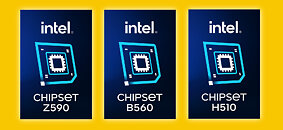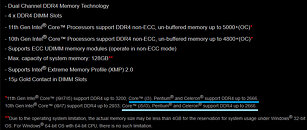- Joined
- Aug 19, 2017
- Messages
- 2,999 (1.07/day)
With the launch of its 500 series chipsets, Intel has officially laid the groundwork for the launch of its Rocket Lake-S CPU lineup. And with the new platform, there are some new features to be expected. The surprising news today is that Intel has enabled memory overclocking on a non-Z chipset like the upcoming H570 and B560 chipsets designed for mid-range motherboards that provide a budget option compared to the Z series that is designed for overclocking. The H570 and B560 chipsets now only lack the support for CPU overclocking, however, with Intel's history of limiting any overclocking exclusively to Z chipsets, this represents good progress nonetheless. However, for any frequencies above 2666 MHz, you need to use a Core i5 processor and above. The Core i3 and Celeron models are not going to support any higher speeds than 2666 MHz.



View at TechPowerUp Main Site



View at TechPowerUp Main Site








